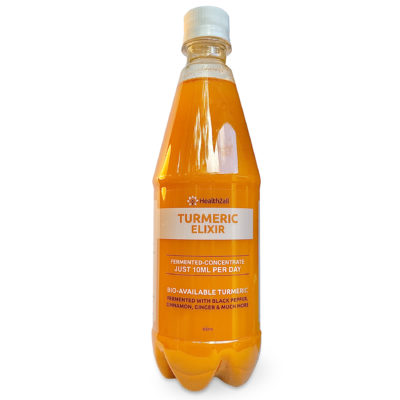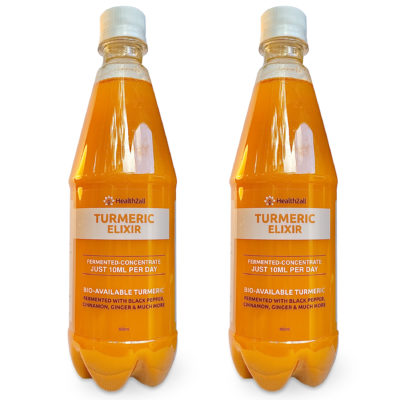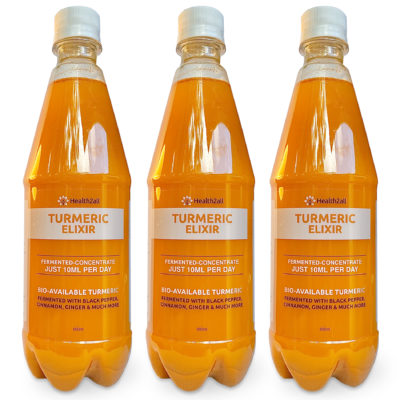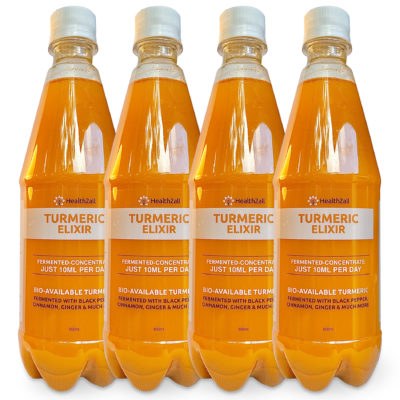Turmeric Elixir Zap – delivers 4500mg of turmeric!
Turmeric Elixir
Turmeric Elixir Zap (liquid turmeric) is a fermented turmeric blended with black pepper, cinnamon and ginger.
Turmeric Elixir Zap!! Each 10ml of our great tasting Turmeric Elixir Zap delivers in excess of 4500mg of turmeric. Turmeric Elixir Zap is rich in probiotics which will promote your gut health helping you to absorb nutrients from the foods you eat.

Everyone suffers from some degree of inflammation. Everyone. As we covered in the previous article on the inflammatory ramifications of improper Omega 3 to 6 balance, unmanaged inflammation can have severe effects on your energy levels, body composition, cognitive performance and overall well being.
In short, inflammation is keeping you from being as awesome as you could be.
Reducing inflammation as much as possible should be a top priority in any diet or lifestyle system sincerely aiming for optimal performance and vibrant health.
Inflammation is a ubiquitous process in the body. It’s evolutionary purpose was primarily to protect damaged tissues against further injury. In our modern world, however, inflammatory pathways are constantly over-stimulated by environmental toxins, poor diet and stress. The result if that low-to-moderate chronic inflammation is as common as having 10 fingers.
Your blood pressure rises with each heartbeat and falls when your heart relaxes between beats. While BP can change from minute to minute with changes in posture, exercise, stress or sleep, it should normally be less than 120/80 mm Hg (less than 120 systolic AND less than 80 diastolic) for an adult age 20 or over.
Arthritis (from Greek arthro- joint + -itis, inflammation, plural: arthritides) is a form of joint disorder that involves inflammation in one or more joints. There are over 100 different forms of arthritis. The most common form of arthritis is osteoarthritis (degenerative joint disease), a result of trauma to the joint, infection of the joint, or age. Other arthritis forms are rheumatoid arthritis, psoriatic arthritis, and related autoimmune diseases. Septic arthritis is caused by joint infection.
Progressive mental deterioration that can occur in middle or old age, due to generalized degeneration of the brain. It is the commonest cause of premature senility
People often use the word depression when they’re talking about moments or periods of time where they feel sad or down. When life gets full on and deals you things like stress, disappointments or grief, it’s really common and normal to feel down about it. However, if you continue to feel lower than usual for a really long time, or if you’re not really sure why you’re feeling that way in the first place, there might be something more serious going on.
The official use of the word depression, which is often diagnosed as ‘major depressive disorder’, is used if these feelings persist for longer than two weeks and start to get in the way of your everyday life. Keep in mind that depression is a condition that can only be diagnosed by a health professional.
Depression ranges from mild to severe, and while there are many possible causes, it’s hard to know if it happens as the result of life events (such as traumatic events or losing someone close to you), biological factors (like an imbalance in certain chemicals in the brain), both, or something else entirely. Everyone who suffers from depression will experience it differently, but there are some common signs and symptoms.
Diabetes mellitus (DM), commonly referred to as diabetes, is a group of metabolic diseases in which there are high blood sugar levels over a prolonged period. Symptoms of high blood sugar include frequent urination, increased thirst, and increased hunger. If left untreated, diabetes can cause many complications. Acute complications can include diabetic ketoacidosis, nonketotic hyperosmolar coma, or death. Serious long-term complications include heart disease, stroke, chronic kidney failure, foot ulcers, and damage to the eyes.
Diabetes is due to either the pancreas not producing enough insulin or the cells of the body not responding properly to the insulin produced.
Any damage to the joints from disease or injury can interfere with your movement and cause a lot of pain. Many different conditions can lead to painful joints, including osteoarthritis, rheumatoid arthritis, bursitis, gout, strains, sprains, and other injuries. Joint pain is extremely common.





